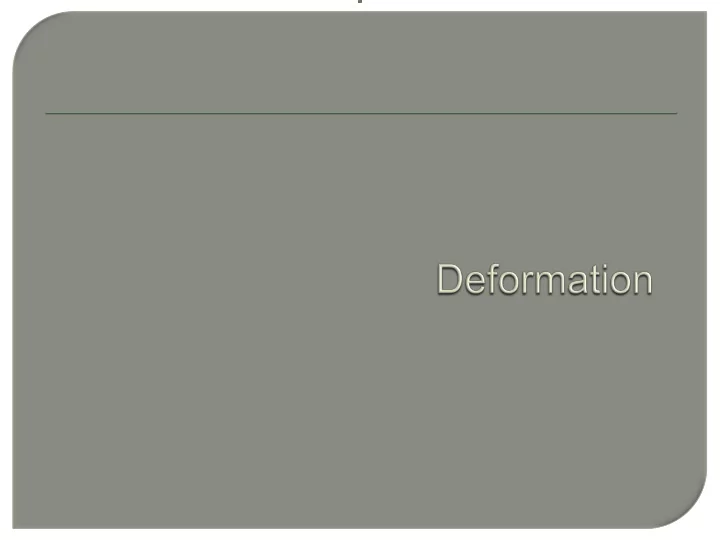

Deformation causes change in the shape keeping typically the same topology Geometric deformation (does not account for any law of physics) Local or global deformation
Deformation: A transformation/mapping of the positions of every particle in the original object to those in the deformed body Each particle represented by a point p is moved by φ ( • ): p → φ ( t , p ) where p represents the original position and φ ( t , p ) represents the position at time t .
• Changing an object’s shape –Usually refers to non-simulated algorithms –Usually relies on user guidance • Easiest when the number of faces and vertices of a shape is preserved, and the shape topology is not changed either –Define the movements of vertices
Hierarchical B-Spline Surfaces
Hierarchical B-Spline Surfaces
Hierarchical B-Spline Surfaces
Hierarchical B-Spline Surfaces
Hierarchical B-Spline Surfaces
Hierarchical B-Spline Surfaces
Hierarchical B-Spline Surfaces
A Barr SIGGRAPH 1984
• Physical Analogy: A clear, flexible plastic parallelepiped with one or more objects embedded in it. • The embedded objects are also flexible so that they deform with the object.
Parametric surfaces are free-form surfaces. The flexibility in this technique of deformation allows us deform the model in a free-form manner. Any surface patches Global or local deformation Continuity in local deformation Volume preservation
� � � 5 � 2 � � v 4 , 3 2 5 3 � � � 2 2 2 ( 1 ) ( 1 ) 2 ( 1 ) u v v u v v � � 4 ( 1 ) ( 1 ) u u v v � � � � � 2 2 2 2 2 ( 1 ) ( 1 ) 2 ( 1 ) ( 1 ) ( 1 ) u v u u v u v � �� CSE528 Department of Computer Science Center for Visual Computing
Basic idea: deform space by deforming a lattice around an object •The deformation is defined by moving the control points of the lattice •Imagine it as if the object were enclosed by rubber •The key is how to define –Local coordinate system –The mapping
Can enforce C k continuity • Surface (s, t, u) = (s(v, w), t(v, w), u(v, w)) • Two adjacent FFDs X 1(s1, t1, u1) & X 2(s2, t2, u2) with common boundary s1= s2= 0 • Conditions for first derivative continuity – ∂ X 1(0, t, u) / ∂ s = ∂ X 2(0, t, u) / ∂ s – ∂ X 1(0, t, u) / ∂ t = ∂ X 2(0, t, u) / ∂ t – ∂ X 1(0, t, u) / ∂ u = ∂ X 2(0, t, u) / ∂ u
Can enforce Ckcontinuity
Can enforce Ckcontinuity
Volume Preservation
Non Parallelopiped Lattice
Non Parallelopiped Lattice
Non Parallelopiped Lattice
Some Results
1. Hirearchical B-spline refinement, DR Forsey and RH Bartels, SIGGRAPH 88, Computer Graphics, Vol 22, No 4, August 1988 2. Fee form deformation of solid geometric models, TW Sederberg, SR Parry, SIGGRAPH 86, Computer Graphics, Vol 20, No 4, August 1986 3. Extended free form deformation: A sculpting tool for 3D geometric modeling, S Coquillart, SIGGRAPH 90, Computer Graphics, Vol 24, No 4, Aug 1990 4. Direct manipulation of free form deformations, WM Hsu, JF Hughes, H Kaufman, SIGGRAPH 92, Computer Graphics, Vol 26, No 2, July 1992
Recommend
More recommend